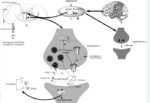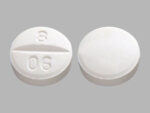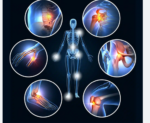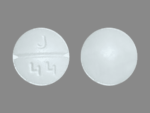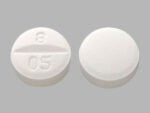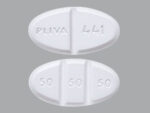Important Warning About Trazodone Hydrochloride
A small number of children, teenagers, and young adults (up to 24 years of age) who took antidepressants (‘mood elevators’) such as trazodone during clinical studies became suicidal (thinking about harming or killing oneself or planning or trying to do so). Children, teenagers, and young adults who take antidepressants to treat depression or other mental illnesses may be more likely to become suicidal than children, teenagers, and young adults who do not take antidepressants to treat these conditions. However, experts are not sure about how great this risk is and how much it should be considered in deciding whether a child or teenager should take an antidepressant. Children younger than 18 years of age should not normally take trazodone, but in some cases, a doctor may decide that trazodone is the best medication to treat a child’s condition.
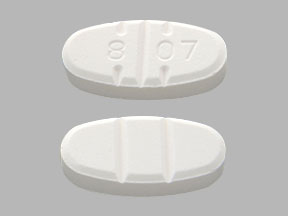
You should know that your mental health may change in unexpected ways when you take trazodone or other antidepressants even if you are an adult over age 24. You may become suicidal, especially at the beginning of your treatment and any time that your dose is increased or decreased. You, your family, or your caregiver should call your doctor right away if you experience any of the following symptoms: new or worsening depression; thinking about harming or killing yourself, or planning or trying to do so; extreme worry; agitation; panic attacks; difficulty falling asleep or staying asleep; aggressive behavior; irritability; acting without thinking; severe restlessness; and frenzied abnormal excitement. Be sure that your family or caregiver knows which symptoms may be serious so they can call the doctor when you are unable to seek treatment on your own.
Your healthcare provider will want to see you often while you are taking trazodone, especially at the beginning of your treatment. Be sure to keep all appointments for office visits with your doctor.
The doctor or pharmacist will give you the manufacturer’s patient information sheet (Medication Guide) when you begin treatment with trazodone. Read the information carefully and ask your doctor or pharmacist if you have any questions. You also can obtain the Medication Guide from the FDA website: https://www.fda.gov/Drugs/DrugSafety/ucm085729.htm.
No matter your age, before you take an antidepressant, you, your parent, or your caregiver should talk to your doctor about the risks and benefits of treating your condition with an antidepressant or with other treatments. You should also talk about the risks and benefits of not treating your condition. You should know that having depression or another mental illness greatly increases the risk that you will become suicidal. This risk is higher if you or anyone in your family has or has ever had bipolar disorder (mood that changes from depressed to abnormally excited) or mania (frenzied, abnormally excited mood) or has thought about or attempted suicide. Talk to your doctor about your condition, symptoms, and personal and family medical history. You and your doctor will decide what type of treatment is right for you.
Trazodone is used to treat depression. Trazodone is in a class of medications called serotonin modulators. It works by increasing the amount of serotonin, a natural substance in the brain that helps maintain mental balance.
Here’s a more detailed breakdown of the off-label uses of Trazodone Hydrochloride:
1. Insomnia
Why it’s used: Trazodone has sedative properties, which make it effective for treating insomnia, particularly when related to depression or anxiety. It helps patients fall asleep more easily and stay asleep longer without the risks associated with traditional hypnotic drugs (e.g., benzodiazepines or Z-drugs like zolpidem).
How it works: At lower doses (25-100 mg), Trazodone blocks histamine and alpha-1 adrenergic receptors, which contribute to its sedative effects, rather than acting primarily on serotonin reuptake as it does at higher doses for depression.
Usage notes: It’s often prescribed to patients who may benefit from an antidepressant with sedating effects, especially if they have a history of substance abuse or tolerance to other sleep aids.
2. Anxiety Disorders
Why it’s used: Trazodone can be helpful in treating generalized anxiety disorder (GAD) and social anxiety disorder, especially in cases where insomnia or other sleep issues are present alongside anxiety.
How it works: By increasing serotonin levels in the brain, it can reduce anxiety and improve mood. At the same time, its calming and sedative effects help reduce physical symptoms of anxiety, like restlessness or tension.
Usage notes: It may be prescribed in doses of around 150-300 mg for treating anxiety. Unlike benzodiazepines, which are fast-acting but can be addictive, Trazodone provides longer-term management without the risk of dependence.
3. Chronic Pain (e.g., Fibromyalgia)
Why it’s used: Trazodone is sometimes prescribed to help manage chronic pain conditions, especially those where sleep disturbances play a role. Patients with fibromyalgia, chronic fatigue syndrome, or other pain syndromes may benefit from its sleep-enhancing effects.
How it works: The drug’s sedative properties help improve sleep quality, which can indirectly reduce pain sensitivity. Better sleep is associated with better pain tolerance, as poor sleep often worsens chronic pain conditions.
Usage notes: It may be used in combination with other pain medications or treatments to address the emotional and sleep disturbances that accompany chronic pain.
4. Post-Traumatic Stress Disorder (PTSD)
Why it’s used: In people with PTSD, Trazodone is often prescribed to help manage symptoms such as insomnia, nightmares, and agitation. PTSD sufferers may have heightened anxiety and disrupted sleep, which Trazodone can address.
How it works: Trazodone’s calming effects, combined with its ability to improve sleep, make it a useful adjunct treatment for PTSD. It doesn’t just induce sleep but helps patients maintain a deeper sleep, reducing the frequency of nightmares.
Usage notes: Trazodone is commonly used as an adjunctive therapy in PTSD, often prescribed alongside more conventional treatments like cognitive behavioral therapy (CBT) or other psychiatric medications.
5. Panic Disorder
Why it’s used: Although not first-line therapy, Trazodone can be prescribed to manage panic disorder, especially in patients who also struggle with insomnia or anxiety. It helps reduce the frequency and intensity of panic attacks.
How it works: By balancing serotonin levels, it can stabilize mood and decrease the occurrence of sudden, overwhelming anxiety. Its sedative properties help prevent the hyperarousal state associated with panic attacks.
Usage notes: Typically, other SSRIs or SNRIs are preferred for panic disorder, but Trazodone may be an option when there are sleep issues or if other medications cause too many side effects.
6. Agitation in Dementia
Why it’s used: In elderly patients, especially those with dementia or Alzheimer’s disease, Trazodone is sometimes used off-label to manage agitation, aggression, and irritability. It is considered safer than antipsychotic drugs, which carry higher risks of severe side effects in older adults.
How it works: Trazodone’s sedative and calming effects can help reduce agitation and improve overall behavior in patients with cognitive impairments. It may also help normalize disrupted sleep-wake cycles, which are common in dementia.
Usage notes: Lower doses are typically used in these cases to minimize the risk of sedation, falls, or orthostatic hypotension (a drop in blood pressure when standing).
7. Other Off-label Uses
- Migraines: Trazodone has been used to help prevent migraines, particularly in people with co-occurring depression or sleep disturbances.
- Alcohol Dependence: It may be prescribed to improve sleep in recovering alcoholics, as sleep disturbances are common during alcohol withdrawal and early recovery.
- Attention-Deficit/Hyperactivity Disorder (ADHD): In rare cases, Trazodone is used to manage insomnia or mood disturbances in children or adults with ADHD, especially if other treatments exacerbate sleep problems.
Potential Side Effects of Off-label Use
- Drowsiness and dizziness are the most common side effects, particularly in those using Trazodone for insomnia.
- Dry mouth, headaches, and blurred vision can occur.
- Orthostatic hypotension (a drop in blood pressure when standing) is a risk, especially in older adults.
- Priapism (a prolonged, painful erection) is a rare but serious side effect, and anyone experiencing it should seek immediate medical attention.
Monitoring and Caution
Trazodone should be used cautiously, especially in elderly patients or those with a history of cardiovascular issues. It’s also important for healthcare providers to monitor for potential drug interactions, as Trazodone may interact with other medications that affect serotonin levels or those that affect blood pressure.
Pain Medications, Pain Relief, and Pain Management
